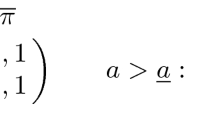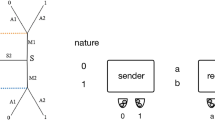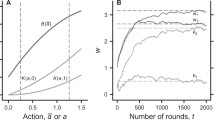Abstract
We explore how learning to play strategically in one signaling game promotes strategic play in a related signaling game. Following convergence to a pooling equilibrium, payoffs are changed to only support separating equilibria. More strategic play is observed following the change in payoffs than for inexperienced subjects in control sessions, contrary to the prediction of a fictitious play learning model. Introducing a growing proportion of sophisticated learners, subjects who anticipate responders’ behavior following the change in payoffs, enables the model to capture the positive cross-game learning observed in the data.
Similar content being viewed by others
References
Brandts J., Holt C.A. (1992) An experimental test of equilibrium dominance in signaling gales. Am Econ Rev 82, 1350–1365
Camerer C.F. (2003) Behavioral Game Theory: Experiments in Strategic Interaction. Princeton, Princeton University Press
Camerer C.F., Ho T. (1999) Experience-weighted attraction in games. Econometrica 67, 827–874
Camerer C.F., Ho T.H., Chong J.-K. (2002) Sophisticated Experience-Weighted Attraction Learning and Strategic Teaching in Repeated Games. J Econ Theory 104, 137–188
Cooper D.J., Garvin S., Kagel J. (1997a) Adaptive learning vs. equilibrium refinements in an entry limit pricing game. Econ J 107, 553–575
Cooper D.J., Garvin S., Kagel J. (1997b) Signaling and adaptive learning in an entry limit pricing game. Rand J Econ 28, 662–683
Cooper D.J., Kagel J.H. (2003) The impact of meaningful context on strategic play in signalling games. J Econ Behav Organ 50, 311–37
Cooper D.J., Kagel J.H. (2005) Are two head better than one? Team versus individual Play in signaling games. Am Econ Rev 95, 477–509
Cooper, D.J., Kagel, J.H.: Context and learning transfer. Mimeo (2006)
Cooper D.J., Stockman C.K. (2002) Fairness and learning: an experimental examination. Games Econ Behav 41, 26–45
Fudenberg D., Kreps, D.M.: A theory of learning, experimentation, and equilibrium in games. Mimeo MIT (1988)
Fudenberg D., Levine D.K. (1995) Consistency and cautious fictitious play. J Econ Dyn Control 19, 1065–1090
Fudenberg D., Levine D. (1998) The Theory of Learning in Games. Cambridge, MIT Press
Gick M.L., Holyoak K.K. (1980) Analogical problem solving. Cogn. Psychol. 12, 306–355
Ho T.H., Camerer C., Weigelt K. (1998) Iterated dominance and iterated best-response in experimental ‘P-beauty contests.’ Am Econ Rev 88(4): 947–969
Kagel J.H., Levin D. (1986) The winner’s curse and public information in common value auctions. Am Econ Rev 76, 894–920
Kreps D.W., Wilson R. (1982) Sequential equilibria. Econometricia 50, 853–894
Milgrom P., Roberts J. (1982) Limit pricing and entry under incomplete information: an equilibrium analysis. Econometrica 50, 443–459
Milgrom P., Roberts J. (1991) Adaptive and sophisticated learning in normal form games. Games Econ Behav 3, 82–100
Miller R.M., Plott C.R. (1985) Product quality signalling in experimental markets. Econometrica 53, 837–872
Moulton B. (1986) Random group effects and the prevision of regression estimates. J Econometrics 32, 385–397
Nagel R. (1995) Unraveling in guessing games: an experimental study. Am Econ Rev 85, 1313–1326
Perkins D.N., Salomon G. (1988) Teaching for transfer. Educ Leadersh. 46, 22–32
Robinson J. (1951) An iterative method of solving a game. Ann Math 54, 296–301
Roth A.E., Erev I. (1995) Learning in extensive-form games: experimental data and simple dynamic models in the intermediate term. Games Econ Behav 8, 164–212
Salomon G., Perkins D.N. (1989) Rocky roads to transfer: rethinking mechanisms of a neglected phenomenon. Educ Psychol 24, 113–142
Selten R. (1991) “Anticipatory Learning in Games” in Game Equilibrium Models, vol 1, Chap 3. New York, Springer
Stahl D.O. (1996) Boundedly rational rule learning in a guessing game. Games Econ Behav 16, 303–330
Stahl D.O. (2003) Action reinforcement learning versus rule learning. Greek Econ Rev 22, 27–56
White H. (1994) Estimation, Inference and Specification Analysis. New York, Cambridge University Press
Author information
Authors and Affiliations
Corresponding author
Additional information
Research support form the National Science Foundation grant number SBR9809538 is gratefully acknowledged. We have received research support from Jo Ducey, Guillaume Frechette, Steve Lehrer, and Carol Kraker Stockman. We have benefitted from comments of Eric Bettinger, John Ham, Jim Rebeitzer, Bob Slonim and seminar participants at Case Western Reserve University, Ohio State University, the University of Mississippi, the University of Illinois, and Purdue University. The usual caveat applies.
Rights and permissions
About this article
Cite this article
Cooper, D.J., Kagel, J.H. Learning and transfer in signaling games. Economic Theory 34, 415–439 (2008). https://doi.org/10.1007/s00199-006-0192-5
Received:
Revised:
Published:
Issue Date:
DOI: https://doi.org/10.1007/s00199-006-0192-5




